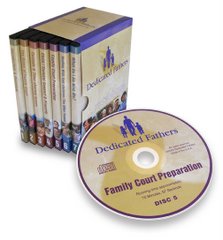
MEDIATION
Part 1 of an ongoing article on Divorce Mediation
By: Marvin Chapman & Dedicated Fathers
http://www.dedicatedfathers.org
There are basically two (2) types of divorce mediation:
Voluntary Mediation and Court Connected Mandatory Mediation.
An overview and general outline of both types of mediation are presented below.
Voluntary Mediation
Generally, at any time you and the other parent have the right to enter into voluntary divorce mediation. Voluntary mediation is where you voluntarily (without any mandates from the court or any other source) take your family court issues to an independent third (3rd) party who is has been specifically trained in the art of mediation and negotiation. The primary function of an independent divorce mediator is to assist you and the other parent in coming to compromised agreements, which are then prepared into court approved documents, which then become court orders.
Court Connected Mandatory Mediation
The second type of mediation is court connected mandatory mediation. This mediation is set up by the family courts and you are mandated by the court to attend. Mediators in court connected mandatory mediation offices are generally professional divorce mediators hired by the court to help parents come up with their own agreements, typically dealing only with custody and visitation issues. There are generally two (2) types of court connected mandatory mediation –
Confidential mediation and Recommendation mediation.
Confidential Mediation
Confidential Mediation is where all that is said and done within the mediation session is kept confidential. There court will never hear what was specifically said or done within the mediation sessions.
Recommendation Mediation
Unlike confidential mediation, in recommendation mediation the divorce mediators actually make custody and visitation recommendations directly to the court. Everything that was said and all behaviors exhibited during the mediation sessions are open for the mediator to interpret, judge and comment upon in open court.
Personal Note: I find it very hard to believe divorce mediators within the recommendation mediation model have the audacity to believe they can learn the dynamics of a particular family and become so familiar with the functioning of that family to the degree they are able to ethically make an intelligent recommendation about what is best for that family. I personally believe this is one of clearest forms of abuse which families are subjected to within the adversarial family court system.
www.dedicatedfathers.org
Get Educated about your rights Now!
Order the Dedicated Fathers Audio Series Today!
Tuesday, January 30, 2007
Divorce Mediation
Posted by
Dedicated Father
at
4:20 PM
9
comments
![]()
Labels: child custody, child support, divorce, family court, fathers rights, law, mediation, survive divorce
A Thank You to all Dedicated Fathers

Thank You for Visiting Dedicated Fathers
www.dedicatedfathers.org
Thank you for being a Dedicated Father. You may not hear that from your children until years from now, you will probably never hear it from society; however, you will hear it repeatedly from us - thank you for being a Dedicated father.
By you visiting this blog, you or someone close to you is probably involved in a divorce, child custody , or family court battle. First and foremost let me assure you: YOU ARE NOT ALONE.
We have assisted thousands of fathers just like you who were confused and intimidated by the adversarial family court process. By empowering parents with information, they have been able to gain the confidence they needed to successfully confront their divorce or child custody case.
Obviously, there is no magic formula, each divorce or child custody case is unique unto itself.
However, there is one fact that is true in every case:
You need power when confronting the adversarial family court system.
You Need Power
Information is Power
You Need Information
Information allows you to make better and more informed decisions for you and your restructuring family. Information helps you remain sane - especially within the insane world of family court. Information will give you the tools to be an example to your children during this traumatic time.
Here are just five (5) examples of the information the Dedicated Fathers Audio Series will give you:
1. It will teach you how to take charge of your relationship with your children, which is the best way to let them know how much they mean to you.
2. It will help you to become pro-actively involved with your divorce case, rather than reactive.
3. It will empower you to confront the procedures of family court, and the inherent biases against fathers.
4. It will provide you with what you need to put yourself in a better position to successfully navigate the adversarial family court system.
5. It will show you how to gain control over your life by learning how to case manage and organize your own divorce or child custody case, thereby making you an actively involved team member with your attorney.
Family court IS NOT about going out and hiring the best family law attorney you can afford, and then just hoping and praying they will advocate for your interests and concerns.
Family court IS about becoming an active team member with your attorney.
Your family court mission statement is the following:
“My mission is to ensure my interests are protected and my concerns addressed in a pro-active and powerful manner. To accomplish my mission, I must be in a constant state of being prepared. I will have to live with the actions I take now, for the rest of my life. Therefore, I must get organized and I must stay organized for the betterment of myself and children.”
Learn from all the fathers who have gone before you. For over 26 years we have been assisting parents going through the trauma of divorce and the family courts. Take our experience and use it. The information in the Dedicated Fathers Audio Book Series will help demystify the confusing and frustrating adversarial family court process. It will help you can gain the confidence you need to confront the processes, procedures and divorce issues with which you will be bombarded throughout your stay in the adversarial family court arena.
Armed with the power of the information in the audio series, you will have with the power-tools needed to successfully complete your mission. For the cost of only one (1) hour with a family law attorney, you will receive the education and information which could save you thousands of dollars. Your future will thank you for your insight of taking the steps today which will bring you a better tomorrow.
Again, Thank you for being a Dedicated Father.
I look forward to your joining our growing family of Dedicated fathers and like them, remember....
YOU ARE NOT ALONE.
By: Marvin Chapman & Dedicated Fathers
www.dedicatedfathers.org
Get the ultimate tool to help you defend your rights!
Order Dedicated Fathers Today!
Posted by
Dedicated Father
at
4:03 PM
0
comments
![]()
Labels: child custody, child support, collaborative divorce, dads, divorce, divorce coach, divorce mediation, family court, family court system, fathers rights
Tuesday, January 9, 2007
Your Divorce or Child Custody Plan

WHAT YOU MAY WANT TO DO (or not do)
IF YOU SUSPECT A DIVORCE OR PATERNITY ACTION
MAY HAPPEN AGAINST YOU
www.dedicatedfathers.org
If you have never been involved in the family court system I can tell you the experience will leave you confused, frustrated and anxious. I have assisted in thousands of cases in the last 25 years, therefore I have learned a lot about the “game” of family court. Below is a list of the significant bullet points which I have gleamed from my years of experience at United Fathers of America. Not all of the bullet points will benefit every person, but every person will benefit by reviewing all of the bullet points. Each reader will need to determine which points are critical for their situation. Again, your primary job is to make decisions about your life. The bullet points below are presented to assist you in making those decisions.
WARNING: Different states have different laws as to what you can and cannot do AFTER a divorce or paternity action has been filed and served. Therefore, the following information is provided as general information for the reader to consider upon the happening of the contingencies as noted. In other words, there may be some things you will want to consider doing BEFORE any papers are filed and restrictions are then placed on what you can and can not do. The following is not a substitute for sound legal advice, it is intended solely to produce critical issues for the reader to consider.
1. You may not want to listen to family, friends or co-workers.
Family, friends and co-workers have an emotional relationship with you. Although well intentioned, their information is based on their experience - not yours. Typically, if you get too excited, they will bring you back down with stories of how hard it can be. Likewise, if you get too depressed, they will lift your up with success stories. In family law, you need sound objective and unemotional answers to your real life questions. As in all of life, in family law information is power - the power you need to make the right decisions for your current and future life.
2. You may want to develop a healthy suspicion of any advice or suggestion given by someone who stands to earn money directly from that advice or suggestion (such as attorneys or paralegals).
Remember, their information, education, tactics and strategies are based on the fact they stand to make money off of you if you follow their advice or suggestion. In other words, they have a financial vested interest in what they tell you. On the other hand, you need to be a pro-active partner with your attorney or paralegal. If you can not get objective unemotional and unattached answers to your real questions from co-workers, family, friends, attorneys or paralegals, then from whom do you get the information and education you need?
3. You may want to seek out a nonprofit organization.
The best way to become involved, informed and educated is to seek out a nonprofit organization or group in which you have faith and in which you feel you can trust and rely upon. Do some research, find out about their reputation, then use this nonprofit group or organization as a sounding board for what is happening in your case and listen to their suggestions and experiences. This series of articles is a great way for you to gain education and information to consider for your case.
4. You may want to gather any and all information you can about divorce or paternity actions. Knowledge and information is power in the family court game.
5. You may want to put together a record of all marital facts including, but not limited to, a list of all assets and all debts.
Get together copies of all tax returns, copies of all pay stubs, copies of all bills including, but not limited to utility payments, credit cards, car payments, house purchase agreements and monthly payments, a list of any and all other bills or expenses, a listing of all assets such as your cars, house or major purchases, etc., and a copy of all important papers such as life, auto, home or medical insurance policies and copies of all retirements accounts. In other words, a copy of anything and everything dealing with any form of asset, debt or important papers. If you do not have, can not find or can not get your records, seek out a good nonprofit organization. With years of experience, they can assist you in obtaining your records. You do not need to hire a high priced attorney to do that which you can do for yourself.
6. You may want to start and maintain a written log, journal, diary or history of all significant events, no matter how small they may initially appear.
Many things are going to be happening in your changing world. Hopefully, most happenings will be peaceful. However, it may be critical to document events for future hearings or other legal actions. You need to note such events as the dates and times when you have the children with you, when you paid support (and how much you paid), and other relevant events. In other words, keep a chronological diary (with pictures if possible) of all family law related events or situations. Consult your support group, paralegal service or attorney for additional specifics of what needs to be documented.
By: Marvin Chapman & Dedicated Fathers
www.dedicatedfathers.org
Go through your divorce knowledgeable and in control.
Order Dedicated Fathers Today!
Posted by
Dedicated Father
at
2:47 PM
0
comments
![]()
Labels: child custody, child support, divorce, family court, fathers rights, law, legal, paternity, survive divorce
Friday, December 29, 2006
To Hire an Attorney or not to Hire an Attorney (Part 2)
TO HIRE OR NOT TO HIRE AN ATTORNEY
Part Two of Two Parts
www.dedicatedfathers.org
For more related divorce information
It has been said that a person who represents themselves has a fool for a client. If this is true, is it also true that a person who hires an attorney has fool in charge of their life?
In other words, you’re damned if you do and damned if you don’t. Therefore, you need to know when, why and how to hire an attorney.
In California, if you appear in court and represent yourself it is called going In Pro Per, which literally means “In one’s own proper person.” Some states call representing yourself Pro Se, which literally means “For one’s own behalf, in person.” No matter what your state may call it, it means you are representing yourself in court. Many people have handled their own family court case, with just a little help in doing the required legal paperwork.
If it appears your case will be routine or normal (meaning no known or expected surprises), and if there does not appear to be a lot of areas of serious disagreement between you and the other side, and if you are comfortable speaking in front of people, then a paralegal or support group can help you save a lot of money by assisting you in representing yourself.
Question?
What kind of people represent themselves?
Answer:
Most people represent themselves because they outright cannot afford a family law attorney. Some people represent themselves because they have been represented by an attorneys in the past and they now believe they can represent their own interests as well, if not better, than their previous attorneys. And there are those who represent themselves because they feel that even if they lose, they will have won by not having to pay the high costs of a family law attorney (some people believe just the fact of not paying an attorney is a “win”).
Reality is that many cases require a family law attorney. An example of a divorce case requiring an attorney would be a case where there is a major confrontation over issues of custody and visitation and/or where there are serious differences over distribution of the community property. These kind of cases mandate an attorney and it would be prudent for you to retain the best attorney you can afford (of course there are those cases wherein you absolutely can not get the money together to hire an attorney. In those cases it is obviously better to represent yourself as best you can, rather than allow a default to be entered against you. In these situations, representing yourself will at least let you know for the rest of your life that you did all you could do).
However, whether or not you hire an attorney, it remains your responsibility to keep your case organized, to keep yourself updated on all happenings in your case, and to continually stay informed as to all facts
The following two sections are presented solely to assist you in determining whether or not you will want to attempt to represent yourself and, if you choose to involve an attorney, some guidelines to assist you in determining which attorney is best for you. You may want to check your state and local rules, regulations and procedures to discover whether the following notions are valid in your particular area.
If Hiring a family law attorney
1. One of the best ways to choose an attorney is to either get a recommendation from your local father’s rights organization or check with family, friends and co-workers. Hiring a family law attorney is just the opposite of hiring a criminal attorney. If hiring a criminal attorney, you want the best legal mind you can afford. Family law is just the opposite. Family law is almost totally subjective feelings and biases. In family law you are hiring a personality, someone you can get along with and who is passionate about your case and your goals.
2. Nothing is worse than a personality clash with the attorney you hired to protect you. This is your and your children’s future. During the initial consultation you will need to make a sound intelligent decision based heavily on whether or not you feel and believe you can work as a team member with the attorney. Remember, your attorney is in the driver’s seat and you need to feel very comfortable with them at the controls of your future. Therefore, when interviewing a family law attorney, you may want to consider some of the following Things to look for in an attorney... and What to avoid when hiring an attorney....
A. Things to look for in a family law attorney...
1) Is the attorney friendly, passionate and non-intimidating;
2) Will the attorney return your phone calls within a “reasonable” time;
3) Does the attorneys’ recommendations make common sense;
4) What does the attorney charge per hour and will the attorney bill you
monthly so you can easily see on a regular basis what the attorney is
costing you;
5) Are credit card payments accepted;
6) How strongly does the family law attorney support alternatives to traditional
litigation,such as outside mediation or collaborative divorce;
7) How much experience does the attorney have in family law;
8) Does the attorney specialize in family law. Just as you would not want a
general doctor to perform open-heart surgery on you, you do not want a
general attorney performing your family law case;
9) Make an agreement with your attorney in writing on your mutually agreeable
and attainable goals. To avoid misunderstandings always put both large and
small requests in writing and keep a copy for yourself (again, stay
organized);
10) Get in touch and stay in touch with a local support organization for
support, encouragement and to ensure your case is proceeding according to
your wishes; and
11) Ensure you will be given a copy of any and all documents filed on your
behalf or served on your attorney relevant to your case.
B. What to avoid when hiring a family law attorney...
1) No matter what, avoid a “divorce mill” type of operation where a group of
people are grinding out paperwork one after another and an attorney just
picks up the paperwork and goes to court. This is not an assembly line
operation, this is your life, your future and your future relationship with
your kids. This is serious business and you will want to treat it that way;
2) Avoid any and all attorneys who tell you their retainer is “non-refundable;”
3) Be suspicious and avoid any attorney who appears overly aggressive and any
attorney who “guarantees” you a certain order. Family law is an extremely
subjective area of law and no one can possibly guarantee anything;
4) Do not share an attorney with the other parent. If your case requires an
attorney, then get your own attorney to protect you and your children’s
legal rights;
5) Whatever it takes, avoid financial problems between you and your attorney.
If for any reason you are unable to honor your financial agreement with your
attorney, immediately request a meeting and work out a new agreement. You
need your attorney playing attorney, not banker;
6) Avoid letting your attorney talk you into giving up something which you
feel is important, just so the attorney can expedite the case. Be
realistic and reasonable, not foolish. Remember, you may have to live with
the results for a long time, a little extra time now can save you a lot of
heartache later. Read all legal papers you are asked to sign, understand
them clearly and completely before signing and always keep a copy for
yourself. If you find unclear language or something that is subject to any
kind of interpretation, ask your attorney to have it rewritten so it is
explicitly clear;
7) If your attorney states you do not need to be present at a hearing, make
sure you find out why you are not needed. If in doubt, have your attorney
put it in writing that you do not need attend and that he/she will make no
agreements without your consent. However, the general rule of thumb is that
you need to attend ALL court proceedings. This is you and your children’s
future and you need to be there, you need and must know what is going on in
your case;
8) After each meeting with your attorney (whether in person or over the phone)
write down what was said, accomplished, promised or planned. Mail a copy of
your written understanding of the meeting to your attorney to memorialize
that the meeting took place and what was accomplished. This will assist
your attorney in keeping on track and will remind the attorney of what was
promised;
9) Avoid telling the attorney how much money you have or how much you are
willing to spend on your case. The attorney’s focus should be about your
case, not how much money you have available to give him/her. If the
attorney talks too much about money - leave the office. An attorney
whose main focus is the money is only feeling you out to see
how much they can get from you up front - how much they can
get for a retainer;
10) Make copies of all important papers to give to your attorney. Avoid giving
originals to your attorney unless absolutely necessary. If absolutely
necessary, ensure you have a copy and assurances the originals will be
returned to you upon completion of your case (unless used as Exhibits
whereupon the originals may stay in the court file);
11) Avoid calling the attorney for every little thing that happens, it will get
very expensive. Attorneys charge by the hour, with every 6 minutes being
1/10th of an hour (Example: If your attorney charges $200 per hour
and you talk to them for 10 minutes; that call will cost you
$40). Many times it may be better to contact your father’s rights
organization first as they can usually answer many (if not most) of your
questions just based on their experience with other fathers over the years.
This will reduce the number of questions and the length of time with your
attorney, resulting in lower attorney fees for you;
12) Avoid keeping an attorney whom you feel is not representing your interests
or your children’s interests fairly or properly. In other words, do not be
afraid to fire your attorney; and
13) Your attorney was hired to do a job about which you know very little. You
should be able to contact your attorney and expect an understandable answer
within a reasonable period of time. Avoid keeping an attorney who will not
return your calls within a reasonable time.
www.dedicatedfathers.org
By: Marvin Chapman
Put yourself in a more powerful position.
Order Dedicated Fathers Today!
Posted by
Dedicated Father
at
11:28 AM
0
comments
![]()
Labels: attorneys, child custody, child support, collaborative divorce, counseling, court case, divorce, divorce coach, divorce mediation, family court, family law attorney, law, legal
To Hire or not To Hire an Attorney (Part 1)
TO HIRE OR NOT TO HIRE AN ATTORNEY
Part One of Two Parts
www.dedicatedfathers.org
Click here for more related stories
It has been said that a person who represents themselves has a fool for a client. If this is true, is it also true that a person who hires an attorney has fool in charge of their life?
In other words, you’re damned if you do and damned if you don’t. Therefore, you need to know when, why and how to hire an attorney.
In California, if you appear in court and represent yourself it is called going In Pro Per, which literally means “In one’s own proper person.” Some states call representing yourself Pro Se, which literally means “For one’s own behalf, in person.” No matter what your state may call it, it means you are representing yourself in court. Many people have handled their own family court case, with just a little help in doing the required legal paperwork.
If it appears your case will be routine or normal (meaning no known or expected surprises), and if there does not appear to be a lot of areas of serious disagreement between you and the other side, and if you are comfortable speaking in front of people, then a paralegal or support group can help you save a lot of money by assisting you in representing yourself.
Question?
What kind of people represent themselves?
Answer:
Most people represent themselves because they outright cannot afford an attorney. Some people represent themselves because they have been represented by an attorneys in the past and they now believe they can represent their own interests as well, if not better, than their previous attorneys. And there are those who represent themselves because they feel that even if they lose, they will have won by not having to pay the high costs of an attorney (some people believe just the fact of not paying an attorney is a “win”).
Reality is that many cases require an attorney. An example of a case requiring an attorney would be a case where there is a major confrontation over issues of custody and visitation and/or where there are serious differences over distribution of the community property. These kind of cases mandate an attorney and it would be prudent for you to retain the best attorney you can afford (of course there are those cases wherein you absolutely can not get the money together to hire an attorney. In those cases it is obviously better to represent yourself as best you can, rather than allow a default to be entered against you. In these situations, representing yourself will at least let you know for the rest of your life that you did all you could do).
However, whether or not you hire an attorney, it remains your responsibility to keep your case organized, to keep yourself updated on all happenings in your case, and to continually stay informed as to all facts
The following two sections are presented solely to assist you in determining whether or not you will want to attempt to represent yourself and, if you choose to involve an attorney, some guidelines to assist you in determining which attorney is best for you. You may want to check your state and local rules, regulations and procedures to discover whether the following notions are valid in your particular area.
If Going Pro Per / Pro Se (Representing Yourself)
1. If you can, get hooked up with a good nonprofit organization. The information and education about the local court system will be invaluable to you.
2. Visit the local family courthouse and observe the procedures in the courtroom. Divorce hearings are open to the public and you are allowed to go in and watch. Paternity actions are usually considered quasi-confidential hearings and therefore you probably would not be allowed to stay. However, the process and procedures are basically the same for both, so if you have a paternity action you can gain the information needed by observing a divorce hearing. While in the courtroom, take notes, study what is happening and why, check out how the judge reacts to certain questions or answers and observe communication styles of the different participants. If questions as to why you are there - tell them the truth, you have a hearing coming up and you wanted to see in advance what it was all about.
3. After the courtroom visit, meet with your advisor or coach to go over any questions which arose from your observation of the divorce proceedings.
4. No matter what happens during the process of representing yourself, never react to the situation. Take a moment to assess what is happening and then act upon it - never ever react. It is almost always fatal for us as males to react instead of proactively acting upon.
5. You and your case will survive the experience in much better shape if you stay out of the gutter, no mud slinging and no disparaging remarks - no matter what.
6. Your future lies in how strong and bold you are able to present your facts to the court, not in how well you react to the allegations from the other parent. Stay in your strength and power, be confident, self-assured and positive. Then, and only then, will you be able to walk away from this experience with your self-respect, self-worth and dignity still intact.
(continued)
BY: Marvin Chapman
www.dedicatedfathers.org
http://www.dedicatedfathers.org
Posted by
Dedicated Father
at
11:09 AM
0
comments
![]()
Labels: child custody, collaborative divorce, divorce, family court, law, legal, mediation
Saturday, December 16, 2006
LEARNING THE “GAME” OF FAMILY COURT
LEARNING THE “GAME” OF FAMILY COURT
www.dedicatedfathers.org
Each state has its own particular laws, customs, precedent setting cases and local rules when it comes to divorce and child custody.. With this caution in mind, the following is an overall education with some general information on issues you may want to ponder when heading into the family court arena.
For many people their first experience with any court is when they experience family court. For many people the family court, divorce, and child custody experience can be devastating. Not only can you lose a good portion of your income, it is also the place where the parents learn when, where and how they will “be allowed” to have time with their children.
After watching numerous television shows featuring attorneys and the court system, many people have preconceived notions about fairness in family courts. The reality is, like any court today, the calendar is packed and relatively little time is devoted to each individual case. Therefore, justice and fairness almost always give way to expediency, which in family law means the orders will be based on biases, prejudices and "feelings," rather than fact, equity and fairness. As a result, both mothers and fathers are usually greatly discouraged and dismayed when they exit the family court system.
The first notion a person needs to understand is that family law is a game. Let’s take a look at just two games:
1. If you walk into your local convenience store and pick up a bag of chips and walk out without paying for them, it’s called “stealing.”
Action: Stealing
Results: Time in jail
2. If you are on first base in a baseball game and you run down to second base, this is also called “stealing” (assuming you are safe at second base).
Action: Stealing
Results: You’re a hero
In both of these games the “Action” is the same: “Stealing.”
3. Question: Why such different “Results” when the “Action” is the same?
4. Answer: Different game - Different sets of rules.
In the game of life, stealing is a crime which will land you in jail. In the game of baseball, stealing is advantages and will make you a hero.
Treating the “game” of family court with the same rules as the “game” of life (truth, justice, honesty, integrity, fairness and equality) would be like playing baseball with the same rules as the game of life (refusing to steal a base because it is against your principles to steal).
Just as it would not make sense to play the game of baseball by the rules in the game of life, it does not make sense to play the game of family law by the rules of the game of life.
You need to know the game you are playing, you need to know about family court.
Family court has also been referred to as being like a game of chess: You need to anticipate the other players move BEFORE they make it. Just like in chess, never, ever play defensively - you’ll be a guaranteed “loser” in family court if you start playing defensively.
Preparation is the most important key to playing the game of family court. Organizing and managing your divorce or child custody case must be your top priority. Do not expect or assume your attorney (if you have one) will be organized or particularly adept at case management. Remember, attorneys went to law school to become litigators to “win” for their clients. You need to stay on top of all issues in your case. You must know and understand your case inside and out.
Family court is a multi-billion dollar business and a big part of the “game” is money. Find this hard to believe? Visit your nearest family court. You will discover the judge sits on the bench for about six (6) hours a day, with as few as 20, to as many as 45 or more cases to hear each day. This translates into about 15 minutes per case.
This literally means your financial future (support) and the amount of time you are allowed to be with your children (custody and visitation) may be decided in 15 minutes or less. If anyone really cared about you, your ex or your children, could they make significant determinations about your life in 15 minutes or less? Again, if you find this notion hard to believe, simply visit your nearest family court, watch a divorce or child custody hearing and see what happens.
While it is true more time is allowed for final “trials;” in most states, the only thing “final” about the final trial is that your status is changed from being married to being single, and your property has been divided. Almost all other issues are open for later interpretations, modifications and future court hearings.
Generally, the issues of custody, visitation and child support are almost always open for future modifications - and those are the hearings which last 15 minutes or less. Again, if someone really cared about you and your reorganizing family, could they make major decisions about your life in as little as 15 minutes?
If money were not the bottom line in family court, it would have been taken out of the adversarial system long ago. Comparatively, there is little money in education, information, mediation, negotiations and collaboration. As in every other area of life, when money becomes more important than people, then truth, justice, honesty, fairness, equality and freedom are sacrificed. Such is the case in family court.
In family court, the family unit, the restructuring of the family, and the needs of individual family members are all sacrificed on the alter of making money. Greed is a great motivator.
Currently, we are stuck with family court being under the umbrella of the adversarial system. Since this is your life, your relationship with your children, and your financial future being decided, you need to retain the role of decision-maker in your case at all times. Although you may retain an attorney or have someone whom you trust as coach, your primary job is to make decisions about your life.
NEVER FORGET
Only you, the other parent and your children will have to live with the final results from family court.
Either way the attorneys and all court related personnel will get paid.
By: Marvin Chapman
www.dedicatedfathers.org
www.unitedfathers.org
Posted by
Dedicated Father
at
4:33 PM
0
comments
![]()
Labels: case, child custody, child support, collaborative divorce, counseling, divorce, family court, law, legal
Family Court and Divorce within the Adversarial system
FAMILY COURT (DIVORCE) WITHIN THE ADVERSARIAL SYSTEM
www.dedicatedfathers.org
Family courts are governed individually by each state, with each state having its own peculiar laws, precedent setting cases and local rules. However, one common thread is no-fault divorce, now the law in one form or another in almost all 50 states.
No-fault divorce simply means one party is not required to prove fault (guilty of some type of misconduct such as adultery or abuse) on the part of the other party in order to justify filing for divorce. Generally, all a person has to say is something like they believe their marriage is irretrievably broken due to irreconcilable differences and a divorce will be granted. Maybe more accurately, no-fault divorce has also been called unilateral divorce because no-fault allows either party, at any time, for any reason (or for no reason at all) to obtain a divorce.
In family court, the "must win" attitude of the adversarial process serves to perpetuate and exacerbate the parental conflict. When the attorney prepares the stage to “win” for their client, they are simultaneously appealing to their client’s sense of justice, vindication and validation. In this adversarial process, parents learn (or are taught by their attorneys) that in order to “win” in family court, they must cast the other parent in a significant bad light.
This “must win” attitude then provides the justification needed for one parent to verbally tear the other parent apart through false allegations of physical or sexual abuse, alcoholism, drug addition or some other form of dysfunction. The fact the party being unfairly and unjustly torn apart is the mother or father of the children involved is totally lost in the emotionally packed adversarial process of “winning at all cost.”
Therefore, in family court, the “truth” of any given situation is rarely discovered.
Generally, the only thing “discovered” in the adversarial family court process is which parent chose the better advocate.
Hopefully the above simplified overview makes the following crystal clear:
Although family court is “no fault”
If you want to be a “winner“
Family court is nothing but fault.
For more information on this topic visit:
www.dedicatedfathers.org
By: Marvin Chapman
www.unitedfathers.org
Order Dedicated Fathers Audio Series Today!
Posted by
Dedicated Father
at
4:21 PM
0
comments
![]()
Labels: case, child custody, child support, collaborative divorce, court case, divorce, family court system, fathers rights, law, legal


















